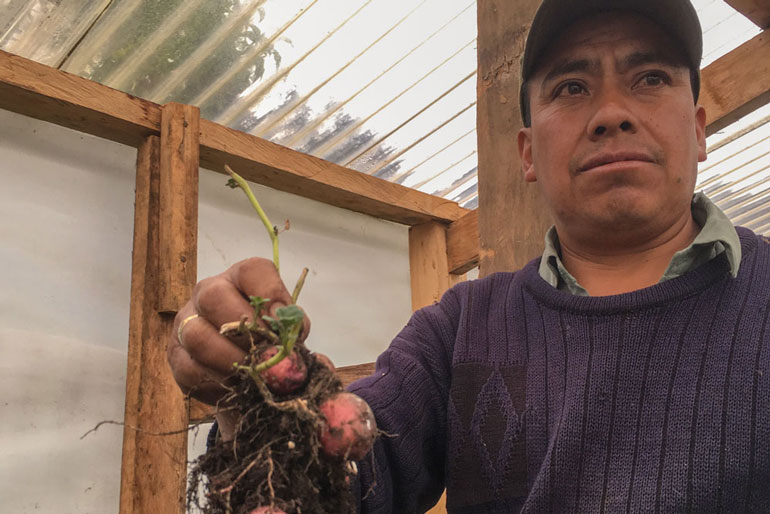Lessons from the potato field: We need farmers’ knowledge
October 11, 2018One of the most valuable resources available to farmers searching for sustainable, effective ways to grow food is simple yet often overlooked: other farmers.

In 2016 we facilitated a farmers’ knowledge exchange: five Indigenous Guatemalan farmers and technical support from our partner, ASOCUCH, travelled to northern Potosí in Bolivia. A few months later, a group of Bolivian farmers and representatives from our organizational partner, PRODII, travelled to Guatemala.
The exchanges featured rich learning about Andean agrobiodiversity and the Seeds of Survival Bolivia program’s best practices. These include selection and production of true (also known as “botanical”) potato seed and its benefits for disease reduction, genetic diversity and storage.
Farmers’ knowledge yields more than food
The impact of this exchange is now being seen in the field. One of the participants, Catarino Ixcoy from Aguacatan, Huehuetenango, Guatemala, has put his learning into practice and is now producing true potato seed.

In 2017, Catarino constructed a small greenhouse following the Bolivian model. He grew two generations of potato using the new greenhouse and has successfully grown and harvested a third generation of potato out in the field for seed production.
And the knowledge sharing continues—he’s now able to share his seed production with surrounding communities.
But Catarino isn’t stopping there. He is also making this a family affair and teaching his son, Marvin, what he learned from the exchange.
Farmers have so much knowledge on their own—imagine the innovations possible when they’re able to come together and share it.
What is true potato seed?
When farmers plant potatoes, they usually use seed potatoes—actual tubers that will grow and produce potatoes with the exact same genetics as the parent plants.
Quechua farmers in northern Potosi are using a different technique to plant potatoes. Instead of planting the tuber, farmers are producing true botanical seeds.

Unlike potatoes produced through tubers—clones of their parents—potatoes produced through seed have their own unique genetics. Harvesting the seeds from the potato fruit allows genetic renewal and produces seeds free from the diseases transmitted through tubers.
As an added bonus, true potato seed stores longer than tubers. Farmer can, in fact, keep the seeds for years. This gives farmers a long-lived emergency seed reserve and a backup plan in case of a lost harvest.